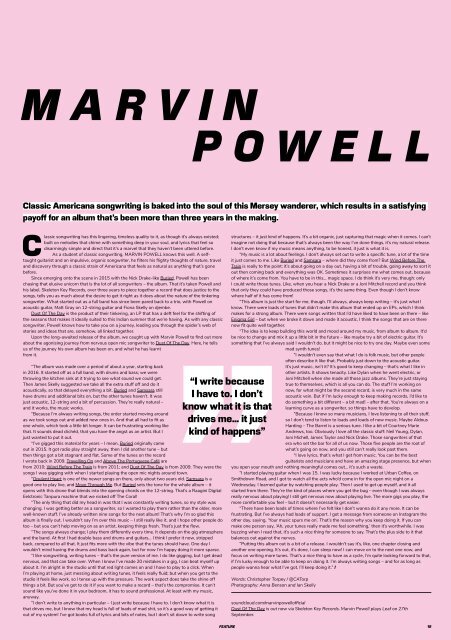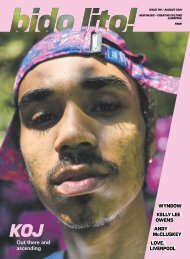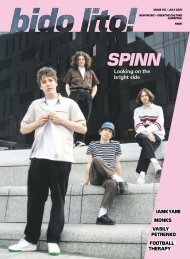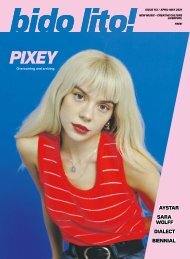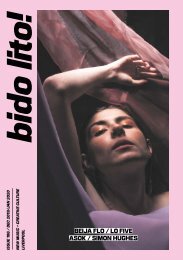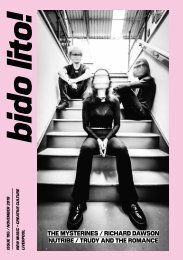Issue 104 / October 2019
October 2019 issue of Bido Lito! magazine. Featuring: STRAWBERRY GUY, MARVIN POWELL, COMICS YOUTH, RICHARD HERRING, BRADLEY WIGGINS, ENNIO THE LITTLE BROTHER, EDWYN COLLINS, SKELETON COAST, WAND, FUTURE YARD and much more.
October 2019 issue of Bido Lito! magazine. Featuring: STRAWBERRY GUY, MARVIN POWELL, COMICS YOUTH, RICHARD HERRING, BRADLEY WIGGINS, ENNIO THE LITTLE BROTHER, EDWYN COLLINS, SKELETON COAST, WAND, FUTURE YARD and much more.
You also want an ePaper? Increase the reach of your titles
YUMPU automatically turns print PDFs into web optimized ePapers that Google loves.
MARVIN<br />
POWELL<br />
Classic Americana songwriting is baked into the soul of this Mersey wanderer, which results in a satisfying<br />
payoff for an album that’s been more than three years in the making.<br />
Classic songwriting has this lingering, timeless quality to it, as though it’s always existed;<br />
built on melodies that chime with something deep in your soul, and lyrics that feel so<br />
disarmingly simple and direct that it’s a marvel that they haven’t been uttered before.<br />
As a student of classic songwriting, MARVIN POWELL knows this well. A selftaught<br />
guitarist and an impulsive, organic songwriter, he filters his flighty thoughts of nature, travel<br />
and discovery through a classic strain of Americana that feels as natural as anything that’s gone<br />
before.<br />
Since emerging onto the scene in 2015 with the Nick Drake-like Buried, Powell has been<br />
chasing that elusive unicorn that is the lot of all songwriters – the album. That it’s taken Powell and<br />
his label, Skeleton Key Records, over three years to piece together a record that does justice to the<br />
songs, tells you as much about the desire to get it right as it does about the nature of the tinkering<br />
songwriter. What started out as a full band has since been pared back to a trio, with Powell on<br />
acoustic guitar, Matt Gray on 12-string guitar and Fiona Skelly on djembe.<br />
Dust Of The Day is the product of their tinkering, an LP that has a deft feel for the shifting of<br />
the seasons that makes it ideally suited to this Indian summer that we’re having. As with any classic<br />
songwriter, Powell knows how to take you on a journey, leading you through the spider’s web of<br />
stories and ideas that are, somehow, all linked together.<br />
Upon the long-awaited release of the album, we caught up with Marvin Powell to find out more<br />
about the agonising journey from nervous open mic songwriter to Dust Of The Day. Here, he tells<br />
us of the journey his own album has been on, and what he has learnt<br />
from it.<br />
“The album was made over a period of about a year, starting back<br />
in 2016. It started off as a full band, with drums and bass; we were<br />
throwing the kitchen sink at it trying to see what sound we could get.<br />
Then James Skelly suggested we take all the extra stuff off and do it<br />
acoustically, so that delayed everything a bit. Buried and Samsara still<br />
have drums and additional bits on, but the other tunes haven’t. It was<br />
just acoustic, 12-string and a bit of percussion. They’re really natural –<br />
and it works, the music works.<br />
“Because I’m always writing songs, the order started moving around<br />
as we took songs out and added new ones in. And that all had to fit as<br />
one whole, which took a little bit longer. It can be frustrating working like<br />
that. It sounds dead clichéd, that you have the angst as an artist. But I<br />
just wanted to put it out.<br />
“I’ve gigged this material for years – I mean, Buried originally came<br />
out in 2015. It got radio play straight away, then I did another tune – but<br />
then things got a bit stagnant and flat. Some of the tunes on the record<br />
I wrote back in 2009. Travelling On and Above The Portuguese Café are<br />
from 2010; Wind Before The Train is from 2011; and Dust Of The Day is from 2009. They were the<br />
songs I was gigging with when I started playing the open mic nights around town.<br />
“Opulent Heart is one of the newer songs on there, only about two years old. Samsara is a<br />
good one to play live, and Move Through Me. But Buried sets the tone for the whole album – it<br />
opens with this drone that blends into the opening chords on the 12-string. That’s a Raagini Digital<br />
Eelctronic Tanpura machine that we nicked off The Coral!<br />
“The only thing that did my head in was that I was constantly writing tunes, so my style was<br />
changing. I was getting better as a songwriter, so I wanted to play them rather than the older, more<br />
well-known stuff. I’ve already written nine songs for the next album! That’s why I’m so glad this<br />
album is finally out. I wouldn’t say I’m over this music – I still really like it, and I hope other people do<br />
too – but you can’t help moving on as an artist, keeping things fresh. That’s just the flow.<br />
“The songs always change; I play them differently every time. It depends on the gig atmosphere<br />
and the band. At first I had double bass and drums and guitars… I think I prefer it now, stripped<br />
back, compared to all that. It just fits more with the vibe that the tunes should have. One day I<br />
wouldn’t mind having the drums and bass back again, but for now I’m happy doing it more sparse.<br />
“I like songwriting, writing tunes – that’s the pure version of me. I do like gigging, but I get dead<br />
nervous, and that can take over. When I know I’ve made 20 mistakes in a gig, I can beat myself up<br />
about it. I’m alright in the studio until that red light comes on and I have to play to a click. When<br />
I’m playing at home, just messing about writing tunes, it feels really fluid; but when you get to the<br />
studio it feels like work, so I tense up with the pressure. The work aspect does take the shine off<br />
things a bit. But you’ve got to do it if you want to make a record – that’s the compromise. It can’t<br />
sound like you’ve done it in your bedroom, it has to sound professional. At least with my music,<br />
anyway.<br />
“I don’t write to anything in particular – I just write because I have to. I don’t know what it is<br />
that drives me, but I know that my head is full of loads of mad shit, so it’s a good way of getting it<br />
out of my system! I’ve got books full of lyrics and bits of notes, but I don’t sit down to write song<br />
“I write because<br />
I have to. I don’t<br />
know what it is that<br />
drives me… it just<br />
kind of happens”<br />
structures – it just kind of happens. It’s a bit organic, just capturing that magic when it comes. I can’t<br />
imagine not doing that because that’s always been the way I’ve done things, it’s my natural release.<br />
I don’t even know if my music means anything, to be honest, it just is what it is.<br />
“My music is a lot about feelings. I don’t always set out to write a specific tune, a lot of the time<br />
it just comes to me. Like Buried and Samsara – where did they come from? But Wind Before The<br />
Train is really to the point: it’s about going on a day out, having a bit of trouble, going away to sort it<br />
out then coming back and everything was OK. Sometimes it surprises me what comes out, because<br />
of where it’s come from. You have to be in this… magic space. I do think it’s very me, though: only<br />
I could write those tunes. Like, when you hear a Nick Drake or a Joni Mitchell record and you think<br />
that only they could have produced those songs, it’s the same thing. Even though I don’t know<br />
where half of it has come from!<br />
“This album is just the start for me, though. I’ll always, always keep writing – it’s just what I<br />
know. There were loads of tunes that didn’t make this album that ended up on EPs, which I think<br />
makes for a strong album. There were songs written that I’d have liked to have been on there – like<br />
Enigma Girl – but when we broke it down and made it acoustic, I think the songs that are on there<br />
now fit quite well together.<br />
“The idea is to keep building this world and mood around my music, from album to album. It’d<br />
be nice to change and mix it up a little bit in the future – like maybe try a bit of electric guitar. It’s<br />
something that I’ve always said I wouldn’t do, but it might be nice to try one day. Maybe even some<br />
mad synth tunes!<br />
“I wouldn’t even say that what I do is folk music, but other people<br />
often describe it like that. Probably just down to the acoustic guitar.<br />
It’s just music, isn’t it? It’s good to keep changing – that’s what I like in<br />
other artists. It shows tenacity. Like Dylan when he went electric, or<br />
Joni Mitchell when she made all those jazz albums. They’re just staying<br />
true to themselves, which is all you can do. The stuff I’m working on<br />
now, for what might be the second record, is very much in the same<br />
acoustic vein. But if I’m lucky enough to keep making records, I’d like to<br />
do something a bit different – a bit mad! – after that. You’re always on a<br />
learning curve as a songwriter, so things have to develop.<br />
“Because I know so many musicians, I love listening to all their stuff,<br />
so I don’t tend to listen to loads and loads of new music. Maybe Aldous<br />
Harding – The Barrel is a serious tune. I like a bit of Courtney Marie<br />
Andrews, too. Obviously I love all the classic stuff: Neil Young, Dylan,<br />
Joni Michell, James Taylor and Nick Drake. Those songwriters of that<br />
era who set the bar for all of us now. Those five people are the root of<br />
what’s going on now, and you still can’t really look past them.<br />
“I love lyrics, that’s what I get from music. You can be the best<br />
guitarists and musicians and have an amazing stage presence, but when<br />
you open your mouth and nothing meaningful comes out… it’s such a waste.<br />
“I started playing guitar when I was 15. I was lucky because I worked at Urban Coffee, on<br />
Smithdown Road, and I got to watch all the acts who’d come in for the open mic night on a<br />
Wednesday. I learned guitar by watching people play. Then I used to get up myself, and it all<br />
started from there. They’re the kind of places where you get the bug – even though I was always<br />
really nervous about playing! I still get nervous now about playing live. The more gigs you play, the<br />
more comfortable you feel – but it doesn’t necessarily get easier.<br />
“There have been loads of times where I’ve felt like I don’t wanna do it any more. It can be<br />
frustrating. But I’ve always had loads of support. I got a message from someone on Instagram the<br />
other day, saying, ‘Your music spurs me on’. That’s the reason why you keep doing it. If you can<br />
make one person say, ‘Ah, your tunes really made me feel something,’ then it’s worthwhile. I was<br />
buzzing when I read that, it’s such a nice thing for someone to say. That’s the plus side to it that<br />
balances out against the nerves.<br />
“Putting this album out is a bit of a release. I wouldn’t say it’s, like, one chapter closing and<br />
another one opening. It’s out, it’s done, I can sleep now! I can move on to the next one now, and<br />
focus on writing more tunes. That’s a nice thing to have as a cycle, I’m quite looking forward to that,<br />
if I’m lucky enough to be able to keep on doing it. I’m always writing songs – and for as long as<br />
people wanna hear what I’ve got, I’ll keep doing it.” !<br />
Words: Christopher Torpey / @CATorp<br />
Photography: Anna Benson and Ian Skelly<br />
soundcloud.com/marvinpowellofficial<br />
Dust Of The Day is out now via Skeleton Key Records. Marvin Powell plays Leaf on 27th<br />
September.<br />
FEATURE<br />
19


